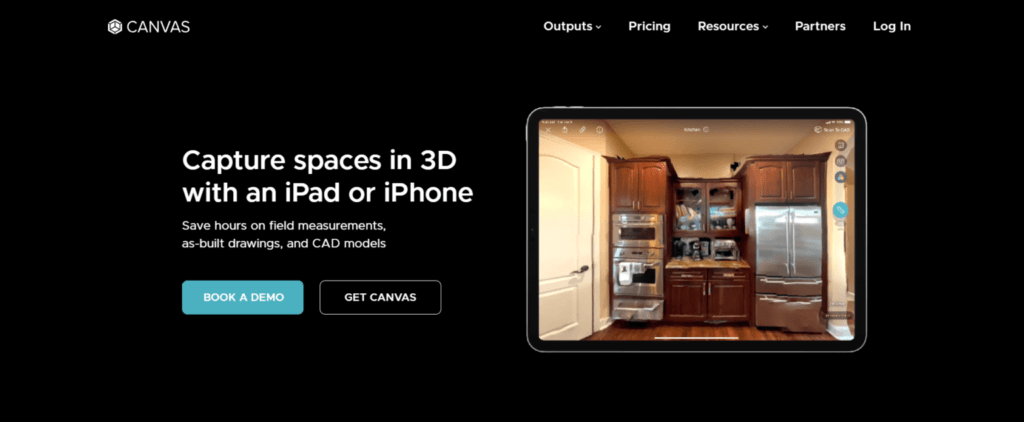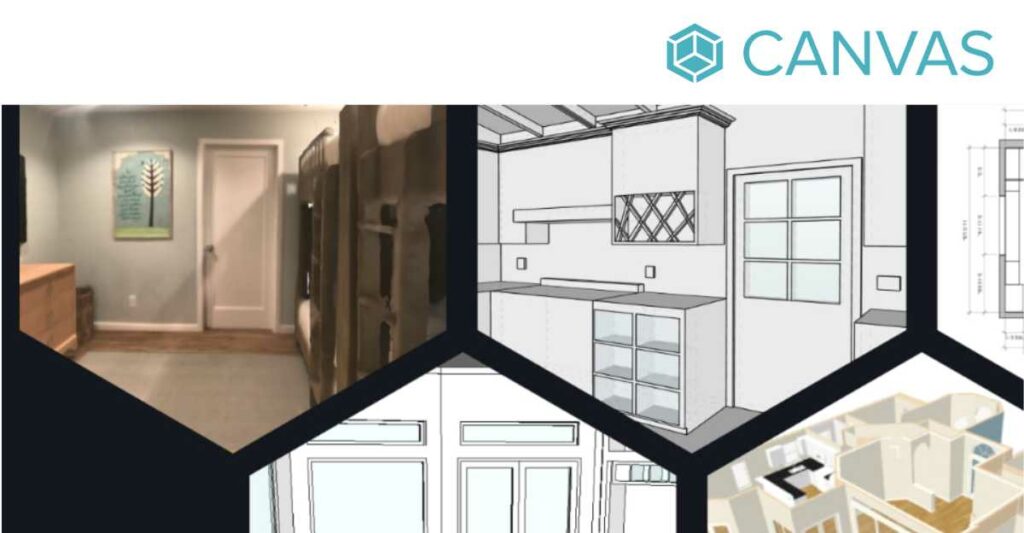Table of Contents
Introduction
Canvas is transforming the way professionals and DIY enthusiasts capture and model spaces. By leveraging LiDAR technology, Canvas allows users to create accurate 3D models and CAD files from simple scans, significantly reducing the time and effort required for traditional measuring and modeling. This article delves into the core features, benefits, and applications of Canvas, providing a comprehensive review for potential users.
Canvas Review

Canvas is a cutting-edge 3D scanning tool designed to simplify the process of capturing as-built conditions and generating CAD models. It utilizes LiDAR-enabled devices, such as the latest iPads and iPhones, to scan spaces quickly and accurately. The tool is highly regarded among home improvement professionals, architects, and interior designers for its ability to streamline workflows and enhance productivity.
Canvas Key Features
- 3D Scanning
Canvas enables users to scan rooms in seconds and entire homes in minutes. The scanning process is as simple as taking a video, making it accessible even for those with minimal technical expertise. - Scan to CAD Service
The Scan to CAD service transforms 3D scans into editable, professional-grade CAD files and 2D drawings within as little as one business day. Supported formats include Revit, SketchUp, Chief Architect, and AutoCAD. - Accurate Measurements
With up to 99% accuracy, Canvas ensures that measurements are precise, allowing users to revisit and measure scanned spaces virtually from any device. - Canvas Web Viewer
Users can access their 3D models anytime, anywhere, through the Canvas Web Viewer, enhancing flexibility and collaboration. - Time and Cost Savings
Canvas significantly reduces the time and cost associated with traditional measuring and modeling. Users report saving approximately $1,500 on measuring and modeling their homes.
Use Cases and Potential Applications
Canvas offers versatile applications across various industries:
- Home Improvement: Ideal for remodelers and renovators, Canvas simplifies the process of capturing as-built conditions and generating accurate models for planning and execution.
- Architecture: Architects can quickly create detailed as-built models, reducing the time spent on manual measurements and data input.
- Interior Design: Interior designers benefit from Canvas’s ability to capture complex spaces accurately, enabling them to focus on creative design rather than tedious measuring.
- General Contracting: Contractors can use Canvas to streamline project planning, improve accuracy, and enhance client presentations.
Who Is Canvas For?
Canvas is tailored for professionals in home improvement, architecture, interior design, and general contracting. It is also suitable for DIY enthusiasts and homeowners looking to undertake renovation projects. The tool’s ease of use and high accuracy make it a valuable asset for anyone involved in space planning and design.
Plans and Pricing
Canvas offers a straightforward pricing model based on the square footage of the scanned space. The cost for 3D CAD & BIM models and Canvas Measurement Reports is $0.20 per square foot, while 2D Floor Plans are priced at $0.14 per square foot. This pricing structure ensures that users only pay for the services they need, making Canvas an affordable option for various project sizes.
Canvas Customer Reviews
Canvas has received positive feedback from users on various platforms, boasting a 4.7/5 rating on JustUseApp. Here are some testimonials:
- “Canvas has transformed my workflow. It’s incredibly easy to use and saves me hours on every project.” – Interior Designer
- “As a contractor, Canvas is a game-changer. It allows me to capture accurate measurements quickly and efficiently.” – General Contractor
- “I love how Canvas simplifies the client onboarding experience. It’s a must-have tool for any designer.” – Architect
Pros:
- High accuracy and precision
- Easy to use with minimal learning curve
- Significant time and cost savings
- Versatile applications across various industries
Cons:
- Requires LiDAR-enabled devices
- Some users report a learning curve for optimal scanning techniques
Important Links and Resources
- Canvas Support: Comprehensive help center for troubleshooting, FAQs, and detailed guides on using Canvas.
- Canvas Scanning Best Practices: Training materials, resources, and courses to enhance skills and understanding of Canvas’s capabilities.
- Canvas Product Demos and Webinars: Access to product demos, webinars, and events to learn more about Canvas and its features.
- Canvas Blog: Insights, updates, and tutorials on using Canvas for various applications.
Social Media
- Instagram: Canvas on Instagram
- Twitter: Canvas on Twitter
- YouTube: Canvas on YouTube
- Facebook: Canvas on Facebook
- LinkedIn: Canvas on LinkedIn
Best Canvas Alternatives and Competitors in 2024
Conclusion
Canvas is a powerful tool that revolutionizes the way professionals and DIY enthusiasts capture and model spaces. Its high accuracy, ease of use, and significant time and cost savings make it an invaluable asset for anyone involved in space planning and design. Whether you’re an architect, contractor, interior designer, or homeowner, Canvas provides the tools you need to bring your projects to life with precision and efficiency.

